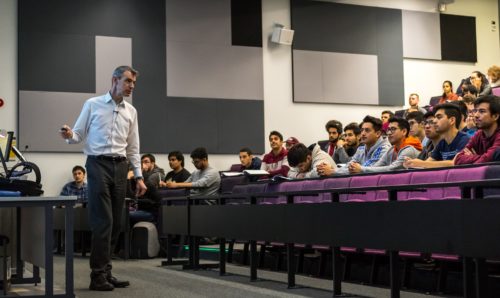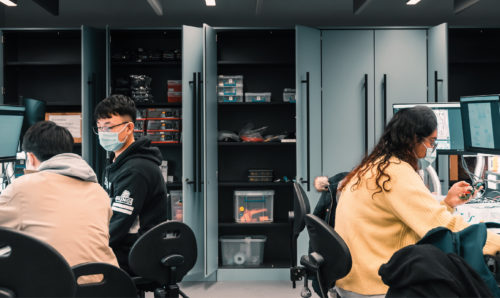The underlying principle of engineering school – short essay
Student experience 8th February 2019
In my previous articles, I discussed engineering from both a personal and societal perspective in order to demonstrate the fundamental applications and communal impact of the discipline. When engineering is discussed in this way, the archetypal interpretation of the “engineer” – who stares at graphs, reference manuals and designs complex systems – subsides to allow for a more holistic and humanitarian view of this field and profession.
In this article however, I will be assuming the inverse approach. Instead of abstracting the field of engineering from its conventional framework, I will attempt to adopt a classical view as Robert M. Pirsig mentions in his seminal work ‘Zen and the Art of Motorcycle Maintenance’ and apply it to the process of successfully obtaining an engineering degree. A professional engineer grows and becomes more skilled by progressively learning to manage and develop more complex systems. My idea for this article is to present to you that perhaps the most fundamental project you will undertake on your path to becoming an engineer is managing your undergraduate degree.
Time Management, Perseverance, Team Work
Since graduation, I actively apply the technical skills and practical subject knowledge that I gained throughout my studies and at the same time, I also find myself utilising the strategies I used to manage my studies successfully; time management, perseverance and team work. Considering this, I realised that obtaining a degree in engineering is fundamentally an engineering problem in itself. Just like a real-world engineering problem, a degree is filled with complex schedules, simultaneous deadlines and above all, hard work. The path towards the completion of your studies appears to have a self-referential structure and in an “Escheresque” manner, progressively reveals its nature to those willing to transverse it.
Embracing the Unknown
What is common to the engineering undergraduate and to the established professional is the constant encounter with “the unknown”. While at University, this is experienced daily. We face the unknown in our textbooks, reference manuals, design projects, even the settings of our modelling software. It is one of the main reasons why our discipline is recognised for being challenging. Like the mythical Hydra, once one head is slain, two new emerge. The professional encounters the unknown within the projects they undertake and the issues and challenges that arise from them. Engineering involves continuous self-reflection where one is constantly reminded that they do not have all the answers. However, this realisation should not overwhelm you, neither while studying at University nor in the real world.
You should instead embrace the nature of this field and allow it to mature you. As engineers, we are trained to excel primarily in one domain: solve complex problems. If the solutions to these problems were trivial and apparent to everyone, the World would not need us. When parents teach an infant how to speak, they communicate proper sentences in spite of the fact that their child can only understand a few words and speak using only certain phonemes. Children are exposed to information whose complexity exceed their current level of comprehension in order to become knowledgeable of that information. An undergraduate course will do the same not only to aid you in obtaining the information but also to ensure that you progressively master the skill of facing and conquering the unknown with persistence and enthusiasm.
Manager and Employee
Another common element in both real-world problem solving and engineering school is the need for management skills. Competence is a strong predictor of your eventual position within a hierarchy, but competence and knowledge on their own have limited impact if not applied strategically. As in an engineering problem, an undergraduate course has a main stakeholder and a key resource: you. You define the outcomes and the eventual impact. It is therefore crucial that you do not merely rely on your ability to perform in the short-term but also understand what is required to manage your ability. You have to interchange between playing the role of the manager and the employee. You are tasked with bringing synergy and harmony to these two facets of your personality.
Elegance and Character
Beyond the mathematical models, complex design architectures and elaborate pieces of software you will use during your course, there is an elegant underlying principle that emerges while studying engineering: the development of character. Character is built by constantly exposing ourselves to tasks beyond our current capabilities, by keenly exploring areas that we have never explored and by committing to becoming capable designers, trustworthy communicators and ultimately, competent engineers. Our ability to accept this responsibility is precisely the reason we are trusted with building the world and shaping its future.
RhodesRodosthenisundergraduate






George says
knowĺedge is power!!